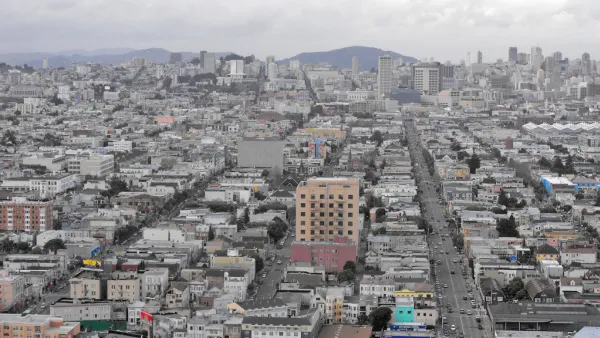At a packed, May 17 meeting in Oakland, filled with transit advocates, tea-partiers, and builders, leaders of the two regional planning agencies selected "Plan Bay Area" as the blueprint to reduce transportation greenhouse gas emissions 17% by 2035.
Michael Cabanatuan writes that "the strategy, approved by the governing boards of the Metropolitan Transportation Commission and the Association of Bay Area Governments... is the Bay Area's attempt to satisfy (the Sustainable Communities and Climate Protection Act of 2008, also known as) SB 375 that requires regions to reduce their greenhouse gas emissions" (from the transportation sector). This is the first step - an environmental review is due next.
The state Air Resources Board has assigned the Bay Area a reduction of greenhouse gas emissions of 7 percent by 2020 and by 15 percent by 2035.
"...the plan establishes a closer connection between housing and transportation planning. Cities and counties are not obligated to follow the plan, but money for transportation improvements would go to areas that adhere to it. But even though the plan is optional, it has generated great controversy, as was evident at Thursday's public hearing, which drew an overflow crowd of about 200 and inspired 70 people to wait for hours to speak."
Writing in the Contra Costa Times, Lisa Vorderbrueggen captures the sentiments of those most fiercely opposed to the plan.
"Property rights advocates assailed the "global climate myth" and the regional planning effort as an unconstitutional and treasonous act that will lead to dense "pack 'em and stack 'em" high-rise transit villages."
"Regionalism equals communism," East Bay Tea Party founder Heather Gass said.
MTC also describes other legislative adoptions that occurred on May 17 in their press release:
"The 'Preferred Land Use and Transportation Investment Strategy' is a key milestone in developing the final Plan Bay Area, which is due for adoption in April 2013. MTC also voted to approve the "One Bay Area Grants" (OBAG) program, and ABAG approved a draft housing allocation methodology for Bay Area cities."
Thanks to MTC Library
FULL STORY: Land-use plan calls for new growth near transit

Analysis: Cybertruck Fatality Rate Far Exceeds That of Ford Pinto
The Tesla Cybertruck was recalled seven times last year.

National Parks Layoffs Will Cause Communities to Lose Billions
Thousands of essential park workers were laid off this week, just before the busy spring break season.

Retro-silient?: America’s First “Eco-burb,” The Woodlands Turns 50
A master-planned community north of Houston offers lessons on green infrastructure and resilient design, but falls short of its founder’s lofty affordability and walkability goals.

Test News Post 1
This is a summary

Analysis: Cybertruck Fatality Rate Far Exceeds That of Ford Pinto
The Tesla Cybertruck was recalled seven times last year.

Test News Headline 46
Test for the image on the front page.
Urban Design for Planners 1: Software Tools
This six-course series explores essential urban design concepts using open source software and equips planners with the tools they need to participate fully in the urban design process.
Planning for Universal Design
Learn the tools for implementing Universal Design in planning regulations.
EMC Planning Group, Inc.
Planetizen
Planetizen
Mpact (formerly Rail~Volution)
Great Falls Development Authority, Inc.
HUDs Office of Policy Development and Research
NYU Wagner Graduate School of Public Service


























